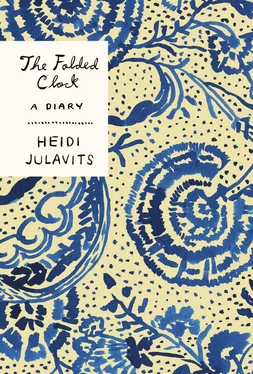For a long time, I did not want to read the Goncourt journals for fear that I would suffer the same fate as these pitied, embittered brothers. Their failure is a contagion to which I feel a greater susceptibility. I have been told, for example, that I “should receive a MacArthur for my e-mails.” This was meant as a compliment, but I heard it as an insult. By reading the Goncourts’ book, I risked suffering the same fate they did. After I am dead, my books of collected e-mails would be passed around and enjoyed at the expense of my other work, and every time anyone complimented my amazing books of e-mails, my accidental oeuvre, while overtly not complimenting my novels, they would do so with an implicit sigh —poor thing .
The other insecurity is reader-related. Everyone loves the Goncourt journals, they just love them! I, however, don’t love the Goncourt journals. My failure of affection has nothing to do with the period nature of their language and observations — Sei Shōnogan, the famous Japanese courtesan and author of The Pillow Book of Sei Shōnogan , is older than the Goncourts by a few thousand years, and I totally relate to everything she writes. I just don’t understand what’s so great about the Goncourts, even though I’ve tried to read them repeatedly, and I’ve traveled with them to other states and other countries, because I don’t want to miss my chance. Suddenly, here, in the Balkans for a literary festival, because of the perfect collision of barometric pressure, and air/water density, the smell of this burning trash, I will understand their greatness!
Today, however, I decided my failure has nothing to do with air pressure. I will never understand. But I wanted a good reason to abandon these Goncourts for good. I found one on page 18, which proves how little traction I ever got in their book. Which proves I did not give the Goncourts a fair shake before I concluded, definitively, that it was okay for me to give up on them. On page 18 the Goncourts write,
Woman is an evil, stupid animal. She is incapable of dreaming, thinking, or loving. They can’t create any poetry or things of that nature except what they are educated to create. The female mind is inherently inferior to the masculine mind. Women are also overly self assured, which allows them to be extremely witty with nothing but a little vivacity and a touch of spontaneity. Man on the other hand is endowed with the modesty and timidity which woman lacks. Women are unbearable if they try to act educated and on the same intellectual level as men .
To object to this kind of antique woman-hating, on principle, would make me too humorless to be endured. Who cares if the Goncourts hated women; so did everyone back then. So probably does everyone now; I suspect the Goncourtian attitude toward women, give or take many conscious degrees of vitriol, to be shared by a few of my friends’ husbands, all of whom I’m fond of, in my way. I enjoy a misogynist so long as they have a wicked sense of humor and know, on some level, that they’re pigs. This is why I enjoy Philip Roth but not Saul Bellow or James Salter. I recall a time in my midtwenties dating career when a suitor, typically around the third date, would give me a James Salter book. Salter articulated these suitors’ internal lives (or their fantasy of their internal lives) without their needing to. Inside, they saw themselves as earnestly arty fighter pilots with souls too deep for any girl to plumb. Salter was their intimacy shortcut. They could hand me a Salter book — supposedly a “gift”—and say without saying, This is me. I might someday say stuff like “Women fall in love when they get to know you. Men are just the opposite. When they finally know you they’re ready to leave .” I appreciated the overture; it prompted me to be expedient in breaking off with these men. Salter helped me see so clearly the unendurable life these men and I would have together, not ever laughing about totally unfunny things.
Today I gossiped with a new friend about the illness of a woman we scarcely know. She and I are both living in a German villa along with a lot of academic policy experts and, in my case, my family. (We are here because my husband received a fellowship from the academy that occupies this villa; the academy awards people, for the length of a semester, money, housing, and food.) The sick woman — she is German — disappeared from the villa a few days after we arrived. This was over two months ago. No one knows what is wrong with her. We’ve asked around. Not even her close friends have a clue. Her story, we assumed, given the secrecy surrounding it, must be incredibly worth knowing. (My friend could offer this single detail about the sick woman: “Her husband was killed a few years ago in Antarctica.”)
My friend, who is Italian, wondered if the refusal to discuss or acknowledge sickness was a specifically German trait. She herself had recently fallen ill; she said she couldn’t stop talking about her illness. She couldn’t stop calling people and telling them how sick she was, and how scared. She narrated in detail her sickness to everyone who would listen. Now she is better, sort of. She’d lost her innocence. Health, she now understood, is the pause between afflictions.
I’d recently lost my innocence as well. I was an illness iconoclast until I wasn’t. At the age of forty-four, after decades of health so entrenched it was mistaken for chronic, I, like her, became sick.
The word “sick,” however, doesn’t accurately describe what befell me. I had pain. I had pain all the time. I was informed by doctors that I would have all-the-time pain for the rest of my life. They used the phrase “pain baseline.” I’d played basketball and tennis in high school. I felt as though I was being initiated into a strange endurance sport, one without a clock or any means to keep score and end the match.
I did not deal with this news well. I asked my husband if he would mind if I killed myself. I tried to sell him on the benefits of my suicide; this stricken, whining person, who wants her around? I described to him the far greater damage I’d inflict on our children by living. By insisting on living, rather than taking an elegant bow (the elegant particulars had yet to be worked out). To insist on living , I lobbied, was sheer selfishness.
I did not want to be selfish.
Eventually I stopped thinking about suicide. Instead I became regularly beset by deep topics like time. I said to my husband, “Perhaps I am meant to be one of the great convalescents.” By which I meant writers who popularized the lap blanket or wrote in bed, and whose literary greatness was proportionate to their physical misery.
So I filled my time with thoughts about my possible future greatness, and about time. Time, since my getting sick, had assumed a new shape. It was no longer linear; it did not cut through my day like a road. I did not see time ahead of me. I experienced time on top of me. I experienced time underneath me. Time became a hollow, vertical enclosure. I moved up and down inside this enclosure; occasionally I would remain stationary, or stable, at a fixed altitude that might be called “the present.”
But because of the pain, I was vulnerable to sudden and extreme altitude shifts. As I dropped or ascended through the enclosure — my tube — I registered the change in air pressure physically. My stomach lifted to my throat. I often experienced my life in fast-forward, as though hurtling toward my death. Not that I cared about dying. What I could not bear to witness was the previews of other deaths that would, if I chose to stick around, precede mine. The eventual death, for example, of the affection my young son feels for me. Suddenly he wasn’t next to me spinning tops. Suddenly he was grown. I did not experience the incremental shifting of his fondness toward me as he became four, and then five, and then twelve, and then thirty-six; I experienced it in a fraction of a second. I experienced it like a stabbing. This little boy whom I was, in the present, gamely entertaining with toys. He was already gone.
Читать дальше












